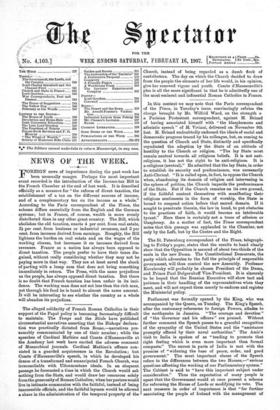In this context we may note that the Paris correspondent
of the Times, in Tuesday's issue, convincingly refutes the charge brought by Mr. Wilfrid Ward, on the strength o a Parisian Protestant correspondent, against M. Briand of having associated himself with "the blasphemous and atheistic speech" of M. Viviani, delivered on November 9th last. M. Briand undoubtedly endorsed the ideals of social and democratic progress traced by his colleague, but, on coming to the question of Church and State, distinctly and specifically repudiated the adoption by the State of an attitude of hostility to the Church or religion. "The lay State must remain neutral towards all religious beliefs. It is not anti- religious, it has not the right to be anti-religious. It is a-religious (neutral)." He admitted that the lay State, in order to establish its security and predominance, was necessarily Anti-Clerical. "It is called upon, in fact, to oppose the Church when, aba,ndoning its domain of religion and intervening in the sphere of politics, the Church imperils the predominance of the State. But if the Church remains on its own ground, if the faithful content themselves with manifesting their religious sentiments in the form of worship, the State is bound to suspend action before that sacred domain. If it sought to penetrate therein, the law in hand, to put obstacles to the practices of faith, it would become an intolerable tyrant." Here there is certainly not a trace of atheism or blasphemy. As a matter of fact, the Times correspondent notes that this passage was applauded in the Chamber, not only by the Left, but by the Centre and the Right.






































